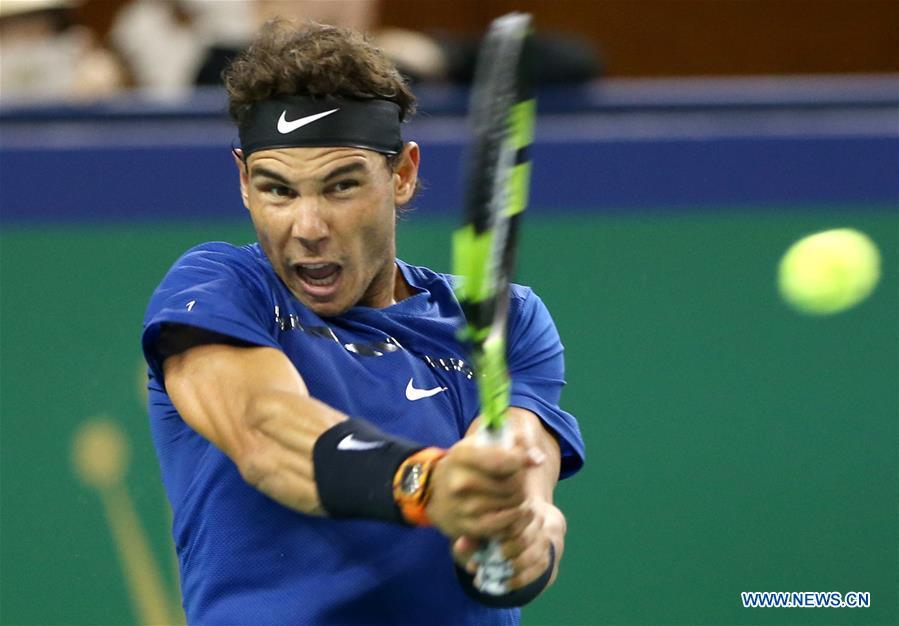Shanghai Masters ushers in new era
 0 Comment(s)
0 Comment(s) Print
Print E-mail China Daily, May 11, 2023
E-mail China Daily, May 11, 2023
The ATP has unveiled a "new era "for Chinese tennis. The elite men's pro tour on Monday relaunched the Shanghai Masters in a move which is set to reenergize the Chinese tennis scene after three years of cancellations due to COVID-19.
Asia's most prestigious tennis tournament will once again be played at Qi Zhong Tennis Center, with this year's action taking place from Oct 2-15, beginning during the Golden Week national holiday, ATP executives announced at Monday's launch ceremony.

Rafael Nadal of Spain hits a return during the singles third round match against Fabio Fognini of Italy at 2017 ATP Shanghai Masters tennis tournament in Shanghai, Oct 12, 2017. Nadal won 2-0. [Photo/Xinhua]
"We are the first and only tournament in Asia to be staged over two weeks. It will provide players with more matches, it will provide fans with more thrilling tennis from some of the most exciting and dynamic athletes in the world, and it will continue to be the spearhead for tennis in Asia," said tournament director Michael Luevano.
"The Rolex Shanghai Masters opened the door to the growth and development of world tennis in China and we are very proud of our achievements," he added.
As one of only nine ATP Masters 1000 events in the world and the only one in the Asia-Pacific region, the Rolex Shanghai Masters has been named "Best ATP 1000 Tournament of the Year" for five straight seasons. It is also one of the five ATP 1000 tournaments being upgraded to two-week "Super Tournament "status this year, with the singles draw expanded to 96 players.
Retired legend Roger Federer, a two-time champion in Shanghai, will return as a guest this year, with the 20-time major winner officially named the tournament's "Icon Athlete".
Barring injuries, the elite of the men's game will battle it out for the trophy, including world No 1 Carlos Alcaraz, four-time winner Novak Djokovic, Rafael Nadal and defending champ Daniil Medvedev.
China's top three players — Wu Yibing, the first Chinese mainland player to win an ATP singles title, Zhang Zhizhen, the first Chinese to reach the quarterfinals of an ATP 1000 Masters in singles, and highly promising newcomer Shang Juncheng — are set to carry home hopes.
Fourteen-year-old junior player Bi Jingtian attended Monday's launch, and despite being a huge Nadal fan, admitted he was raring to catch Alcaraz in action.
"After the upgrade of this year's Masters, there are more matches and more participants. I will be watching from the stands to try to improve my skills," Bi said.
Offering fans a glimpse of the sport's future, the ITF J100 international youth tournament will be staged simultaneously at Qi Zhong, and will feature boys' and girls' singles and doubles competitions.
"The players coming through now are all young and they have a lot of room to become even better and potentially go all the way to the top," said ATP CEO Massimo Calvelli.
With Wu and Zhang spearheading a Chinese resurgence on the ATP Tour, Calvelli is confident exciting times are on the way.
"When that happens in a specific market, it creates momentum, it creates attention, it creates participation and iconic athletes, or at least performances at a high level. They tend to drag more people to the sport. So I think that is certainly one element that is playing in favor of the future success of the sport in China," Calvelli said.
Calvelli believes it's important for the ATP to capitalize on the soaring popularity of Chinese players and the sport's growing grassroots base here.
"We're making investments in terms of cooperation with academies on the ground. Even at Qi Zhong, the plan is to develop an academy and a tennis team within the center. This creates opportunities for young tennis fans and athletes who want to play tennis, ultimately offering them the right environment to become future professional players," he added.
Yang Yibin, general manager of tournament owner Shanghai Juss Sports, echoed those sentiments, stressing the importance of developing the right facilities.
Yang said that the construction of a tennis ecosystem mainly involves three aspects: venues, events and players. In addition to upgrading and centralizing tennis courts, Juss Sports regards membership-based clubs, youth training and maximizing public access to courts as key elements of this strategy.
Taking cues from professional tournaments, the company plans to organize more amateur competitions, according to Yang.
"Teenage competitions are not profitable, but they are a great platform for promoting and popularizing tennis, testing the quality of training, and discovering young talent," Yang said.
"The development potential of tennis in the Chinese market is enormous, and a good market for emerging projects requires better resources," he added. "This all feeds into the upgrade of this year's Shanghai Masters."






Go to Forum >>0 Comment(s)